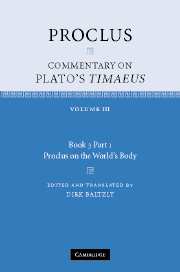Introduction to Book 3
Published online by Cambridge University Press: 30 June 2022
Summary
THE STRUCTURE OF BOOK 3 OF PROCLUS’ COMMENTARY
The portion of Proclus’ commentary translated in this volume takes in Timaeus 31b–34b in which Plato describes the body of the universe. However, Book 3 of Proclus’ commentary – equivalent to volume II of the Teubner text of the in Timaeum – spans Timaeus 31a to 37c and thus includes Timaeus’ discourse on the construction the World Soul and its union with the body of the universe. Because of the wealth of detail involved in Book 3 as a whole, the translators have taken the decision to dedicate a volume each to the body and soul of the universe (volumes III and IV respectively). The final volume of our series (volume V) will condense into one the translation of Books 4 and 5 of Proclus’ commentary – equivalent to the third volume in the Teubner series of Proclus’ text.
The question of the skopos or target of the Timaeus in general is taken up in the introduction to volume I. Notionally, the skopos of the dialogue is supposed to be physiologia or the study of the realm of nature (I. 1.17– 20). ‘Nature’ here should be given its Aristotelian sense: what is at issue is the realm of things that change. This will include the body of the world as well as its soul, the individual heavenly gods such as stars and planets, as well as the kinds and individuals that inhabit the sublunary realm. However, we must remember Proclus’ views on (what he takes to be) the characteristically Platonic manner of explaining things in the realm of nature by reference to productive, paradigmatic and final causes (I. 2.1– 9). By his lights, Plato's exploration of the subject matter of physiologia traces the explanation of these things back up to the Demiurge, the paradigm of the All-Perfect Living Being, and the Good. Moreover, the universe that is described as if it came to be in the Timaeus is itself a ‘visible god’ (34ab). Thus from Proclus’ point of view, the Timaeus is actually a profoundly theological work.
- Type
- Chapter
- Information
- Proclus: Commentary on Plato's Timaeus Volume 3: Book 3 Part 1: Proclus on the World's Body , pp. 1 - 32Publisher: Cambridge University PressPrint publication year: 2007



